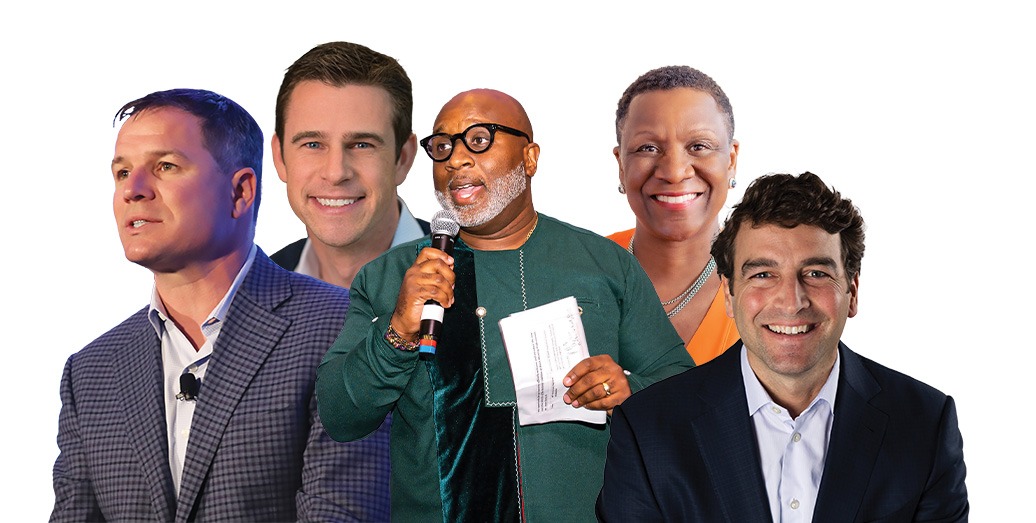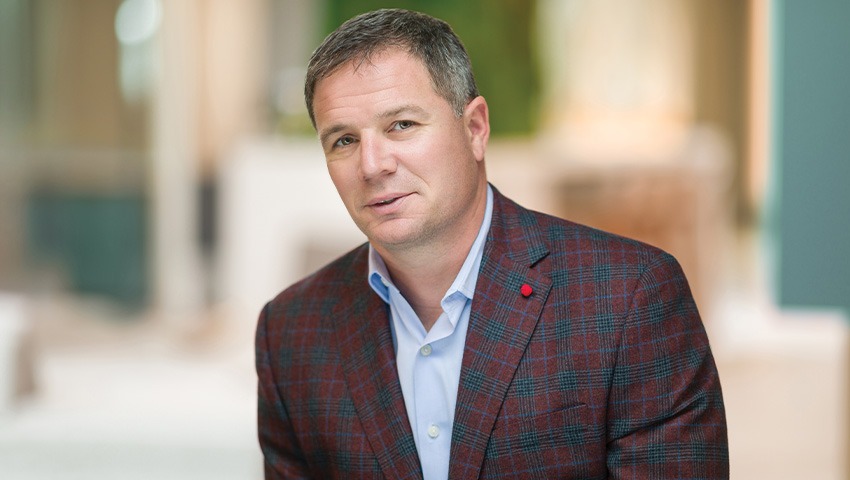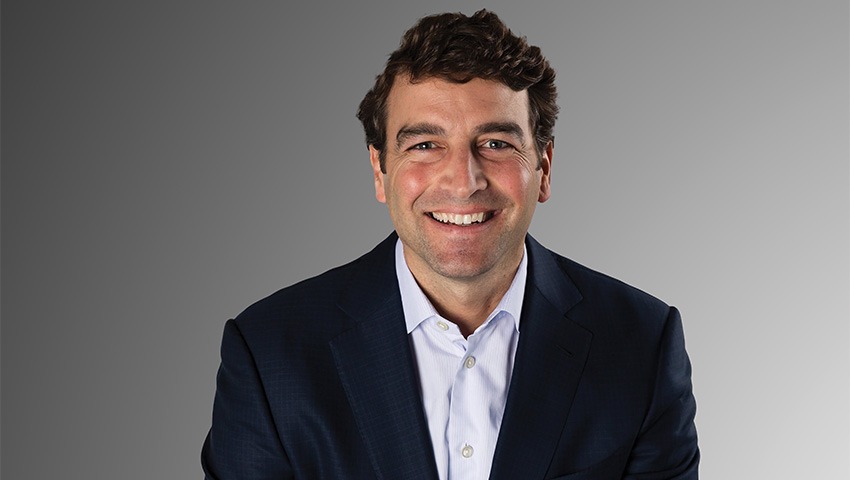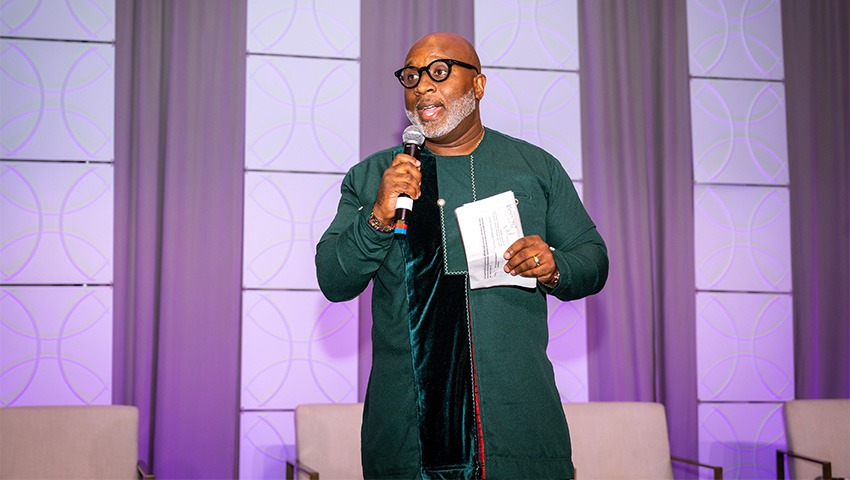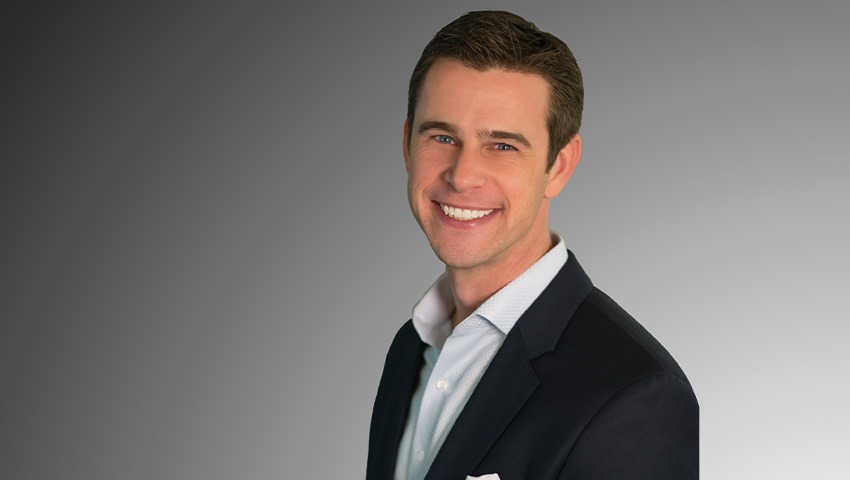5 industry giants share insights
“Millions saw the apple fall, but Newton was the one who asked why,” said American financier and statesman Bernard Baruch in the early 1900s. His observation still rings true in our own century. We look to our leaders to see the bigger picture and ask the big “whys.”
Especially in the wake of devastation to the meetings and hospitality industry wreaked by the pandemic, leadership insights are relevant and needed. In that spirit, we asked five leaders—each with his or her own vantage point and perspective—to share lessons in the form of their answers to five questions we posed.
And to also glean insight into each of them as a leader and person, we asked them to share a bit about who they are and what made them so. (Responses have been lightly edited for clarity and brevity.)
Geoff Freeman
President & CEO, U.S. Travel Association
Past roles: president & CEO, Consumer Brands Association; president & CEO, American Gaming Association; chief operating officer, U.S. Travel Association
“U.S. Travel will soon launch a Group Travel Advisory Board. There are so many bright minds across the industry that can advise us.”
Who influenced you most to become the leader you are?
Too many to name—and their work continues. From my parents to wife to kids, teachers to coaches, to workplace mentors, association members, to peers to colleagues—all have refined my ability to treat others respectfully, challenge conventional thinking and focus on what I am best at doing.
Biggest challenge you overcame to become who you are?
I have so much respect for those that have overcome real challenges: family, financial, health, etc. I’ve been blessed with a lot of good fortune over the years—which makes me grateful and, more and more, inclined to enjoy the journey.
Worst advice you ever got?
“Slow down.” My belief is that we’ve got a limited window to make a big difference. We need to proceed thoughtfully and assertively. I’m not content, and I like to surround myself with people that are wired similarly.
Best advice?
“Your arrogance has taken you as far as you’re going to go.” Ouch. It wasn’t what I wanted to hear—but apparently needed to hear. The point was that this was the end of the line for being an individual performer and trying to accomplish everything on my own. Future success would be driven by building teams, collaborating and helping make those around me better. I’m grateful for the tough love.
Lessons in 5 Answers
What about the meetings and hospitality industry keeps you up at night?
Determining where we can make the greatest difference in terms of driving growth. U.S. Travel’s unique mission is to increase travel. What are the greatest obstacles to group travel? How can our industry be successful in educating business leaders on the benefits of group travel? Answering those questions—and many more—is critical to focusing our efforts.
If you could grant one wish to the industry, what would it be?
Focus. We’ve got so many issues coming at us—from workforce to sustainability, to public health and many others. How can we drive a focus around the problems we are best equipped to solve? Where can the collective industry make the greatest difference in growing the meetings pie?
What is the biggest thing C-suites and the political establishment get wrong about our industry?
Business and political leaders tend to struggle with what constitutes the meetings industry. But I’m not sure we do them any favors—we call it meetings, group travel, exhibitions, incentives, conferences, conventions, trade shows and so much more. Of course, we in the industry get the distinctions—but they’re probably lost on those outside of our industry, and we would benefit by simplifying our terminology.
How can the meetings and hospitality industry attract its leaders of the future?
The broader travel industry is a special place to be—it’s experiential. We’re not manufacturing goods, dealing with esoteric issues or otherwise making our brains numb. We’re creating tremendous experiences for our customers and often enjoying the experiences ourselves. This is a point of distinction worth emphasizing with future leaders and worth embracing as we share our story.
What is our industry’s biggest untapped potential—and how can it be unleashed?
That’s exactly what we need to figure out and why U.S. Travel will soon launch a Group Travel Advisory Board. There are so many bright minds across the industry that can advise us on where growth comes from, what obstacles need to be removed and how we prepare the industry for the future.
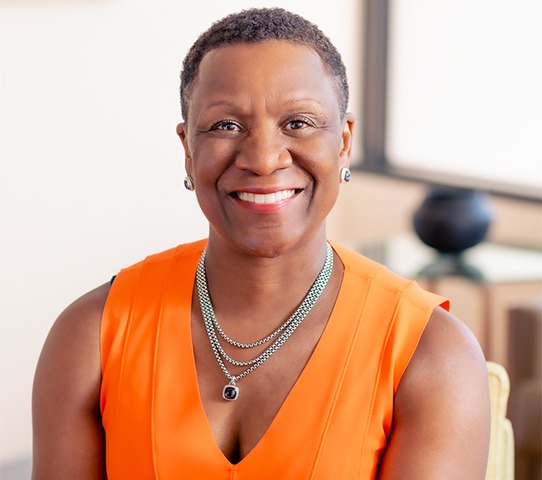
Michelle Mason
President & CEO, ASAE: The Center for Association Leadership
Past roles: president & CEO, Association Forum; managing director, strategy and innovation, American Society for Quality; vice president, strategic and future-focused research, ASAE
“We have to be entrepreneurial and risk-takers and try new things even if it sometimes doesn’t play out exactly as you hope.”
Who influenced you most to become the leader you are?
I am proud to stand on the shoulders of many association leaders in our industry as well as some of the dynamic leaders who helped shape ASAE over the years. I consider myself a product of the association community. These leaders have impacted me through their servant leadership and leading by example. The time and genuine interest they have invested in me has shaped me to be who I am today.
Biggest challenge you overcame to become who you are?
Learning early on to trust your instincts. When you’re younger and greener in the industry, you may have some doubts that give you pause. But I figured out that I have a pretty good ability to quickly observe and assess an opportunity. The important thing to me is being able to seize on opportunities because sometimes, as we know, speed to market is crucial and you have to trust what your gut is telling you—informed by intelligence, of course.
Worst advice you ever got?
I try to always find the good in feedback from others. I consider feedback to be a gift. Seek first to understand.
Best advice?
I’ve benefited from many words of wisdom over the years, and I think one of the best things about this industry is the willingness of leaders to share what they’ve learned. But two pieces of advice have stuck with me. First, listen more. In an industry like this with many stakeholders, you have to listen to what people are telling you they need to be successful. And then resist the urge to play it safe. We have to be entrepreneurial and risk-takers to some degree and try new things even if it sometimes doesn’t play out exactly as you hope.
Lessons in 5 Answers
What about the meetings and hospitality industry keeps you up at night?
The events industry is really about bringing people together with purpose, and we all know how challenging that core function was during the pandemic. Beyond the lingering repercussions of the pandemic, there are near-term concerns this year with inflation, so the ROI for prospective attendees has to be high. Connecting face-to-face is so enriching, but the total meeting experience has to be next-level and quality to incentivize our audience to make the time and investment. Not to mention the impact sustainability is having on decision-making. I spend a lot of time envisioning how to make sure our events exceed our attendees’ expectations with clear outcomes that can be put into practice.
If you could grant one wish to the industry, what would it be?
To focus not just on the economics of face-to-face meetings, but on the legacy they want to leave behind in the communities where we meet. Associations and their destination partners and sponsors have tremendous resources that can be leveraged to create a lasting, positive impact in our host destinations. I don’t just mean doing a community service project during a meeting, either. I think there are opportunities to work together as an industry to improve the quality of life in our communities long-term.
What is the biggest thing C-suites and the political establishment get wrong about our industry?
I don’t think the political establishment has focused enough on removing barriers that inhibit the industry, probably because they don’t fully understand the true economic impact of meetings and events on host communities and the U.S. economy. The pandemic truly decimated this industry.
Data from the U.S. Travel Association indicates that $97 billion in meeting and event-related travel spending was lost in 2020 alone. As a result, 640,000 Americans lost their jobs. And yet our air travel system is desperately in need of federal government attention. Our visa wait times for international travelers who want to come to a meeting in the U.S. are unacceptably long. The industry could use some help to return to full prosperity.
How can the meetings and hospitality industry attract its leaders of the future?
It’s critical that event industry leaders continue to work toward fostering a culture of intentional inclusivity and belonging in our workplaces. We need to remove artificial barriers to growth. I do think we are seeing a transformation taking place in the industry, where leaders are embracing change and thinking more boldly about the future. And when we’re looking at safeguarding the future of our community, we have to think about our commitment to DEI as it relates to leadership development.
What is our industry’s biggest untapped potential—and how can it be unleashed?
We’re just beginning to tap into and integrate the use of data-driven technology to customize our event experiences for attendees, which is really exciting for the future of the industry. The more we understand about our attendees’ behaviors, preferences and interests, the better chance we have of creating memorable meeting experiences and developing a deeper connection with our audience.
Lastly, we need to think broadly and intentionally about the importance of sustainable meetings. It is more than waste and food choices. We need to always remind ourselves of the environmental effects through all stages of the meeting and the negative impact our decisions and potential have.
Ben Erwin
President & CEO, Encore
Past roles: chief financial officer, Encore; chief financial officer, TestAmerica; board member (current), American Hotel & Lodging Association
“I’d love for our people to have more consistent calendars, rather than heroic months that stretch them over capacity and take them away from their personal lives, families and the joys of life.”
Who influenced you most to become the leader you are?
My parents. My father taught me the value of hard work and my mother would remind me it’s all about the people. The combination of these two values says a lot about who I am today. My dad was successful because he would outwork anybody. For as long as I can remember, he was teaching my brothers and I the value of hard work. As kids, that often meant spending weekends doing yard work. If there weren’t any chores left to do, he wasn’t afraid to have us dig holes and fill them back in! I just saw him recently, and the first thing he did after he hugged me was to check my hands for calluses (or in my case, the lack thereof) to measure how hard I was working.
My mother was the perfect complement. She was special because of her relationships and communities. She instilled in me, as the oldest of four boys, my purpose to put people before an idea. One of the greatest lessons she taught me: If you see anyone sitting alone, go sit with that person. I still try to practice that today.
The biggest challenge you overcame to become who you are?
On the spectrum between wanting things to be perfect and not sweating the small stuff, I’ll be honest, I lean more toward perfectionism. I want the best of what’s possible. The catch is that often people who seek perfectionism feel a great deal of burden and stress, but I don’t. I think that is the result of not being afraid of hard work, feeling a deep responsibility to the teams I am part of, and excitement for what’s possible. With those values balanced at the forefront, it’s a lot easier to get it right and not have to overcome traits like perfectionism. At least that’s what I tell myself!
Worst advice you ever got?
“The end justifies the means.” Never the right answer.
Best advice?
“Balance.” Life is about its many, many wonderful things.
Lessons in 5 Answers
What about the meetings and hospitality industry keeps you up at night?
Figuring out a way for an industry that is so great to be able to be a place people can build careers and invest their lives in. With the departure of great talent from our industry in the pandemic, it’s important that leaders are thinking about how to create companies that are great places to work for all. I want people to feel excited, challenged, included, rewarded and that the industry has become a community that they just can’t imagine leaving.
If you could grant one wish to the industry, what would it be?
I would balance out the event calendar to be evenly spread five days a week over the 52 weeks of the year. We all love what we do, but it’s no secret that busy periods like October put a strain on the system. I’d love for our people to have more consistent calendars, rather than heroic months that stretch them over capacity and take them away from their personal lives, families and the joys of life.
What is the biggest thing C-suites and the political establishment get wrong about our industry?
Business leaders and elected officials can underestimate the impact of meetings. They are business drivers, both economically and culturally. Too often events are thought of as an expense and not seen for their return on investment. There’s important work to be done to continue to articulate the value that meetings deliver for innovation, growth and the overall health of organizations and communities.
How can the meetings and hospitality industry attract its leaders of the future?
I get excited thinking about how we hand the microphone to a diverse set of leaders so that they can make their career paths known. I’d love every technician, producer, sales associate, front desk agent and housekeeper to know there is real opportunity for them in our industry and that they see the paths to a seat at the decision-making table.
What is our industry’s biggest untapped potential—and how can it be unleashed?
Remind key stakeholders of the power of travel and face-to-face events. I’d argue our role is more important today than it was pre-pandemic. The energy we all experience bringing communities together creates something special . . . something that can change the world for the better. Our role is not just to connect our attendees, but also to inspire them to advance the purpose of their organizations.
Jason Dunn Sr.
Executive Director, National Coalition of Black Meeting Professionals
Past roles: vice president, diversity sales & inclusion, Cincinnati USA Convention & Visitors Bureau; chair, Greater Cincinnati Northern Kentucky African American Chamber of Commerce; cochair, 107th NAACP National Convention Blue Ribbon Committee
“I wish the industry would stop exploiting the word ‘diversity’ and aim for the goal of inclusion, equity and belonging.”
Who influenced you most to become the leader you are?
My parents and the village that they created around me made me who I am. There are many reasons why, but I’ll keep it simple with four examples. They taught me to always do things that you believe in. They taught me that loyalty can’t be bought, it’s earned. They taught me to strengthen my spiritual foundation each day. And, finally, they taught me to never forget the courage of my ancestors in times of despair.
The biggest challenge you overcame to become who you are?
When you’re the first or the only one, you oftentimes doubt your abilities. You begin to question if the honor you’re carrying is worth it. In some cases, the constant dimming of your intelligence to make your leadership feel adequate is mentally draining.
For me, I struggled for a long time wondering why my leadership was competing with me. I couldn’t grasp it, and it consumed me to the point that it began to affect my health. It was a pretty dark time for me, and I chose to focus on me and find opportunities that aligned with my passion. Sometimes, fighting the small things when you were built for big things become harmful to you. So, I decided to fight big!
Worst advice you ever got?
“Trust the process.”
Best advice?
“Never forget who or whose you are.” This quote has given me the confidence to persevere in difficult times by reflecting on my faith and the sacrifices of my ancestors.
Lessons in 5 Answers
What about the meetings and hospitality industry keeps you up at night?
The National Coalition of Black Meeting Professionals is rooted in the idea of equity. Our founders organized 40 years ago to ensure that destinations that hosted their meetings had executive representatives of color with budgets and staff. Most of our members are trailblazers and have earned the honor and burden of being the first in many executive leadership roles. We have members who are and were the first Black presidents, chairpersons, executive directors, directors of sales, managers and vice presidents who would not have had the opportunities if NCBMP did not exist.
In continuation of the progress we have made over the last 40 years, the honor and burden to ensure that these individuals are supported rest on my shoulders as the executive director. I take that very seriously. I know what it feels like to be the first and the only. The inner war within ones’ self to practice restraint or speak up is exhausting and real.
NCBMP has the unique obligation to not only curate business-to-business opportunities for our constituents, but we must also carry the social, economical, cultural and political weight that follows them everyday. It is my aim to show the globe that members of NCBMP can compete at all levels. In order to do this, we cannot rest and must always keep pushing and lifting as we climb.
If you could grant one (or three) wishes to the industry, what would they be?
First, I wish the industry would stop exploiting the word “diversity” and aim for the goal of inclusion, equity and belonging. Celebrating diversity when budgets, staff, board recruitment, sponsorships and partnerships do not reflect what you’re communicating is hypocritical. In other words, many organizations have public-facing diversity only. And most of those diverse executives have no budget, no staff, no authority, no measurable goals and no authorization.
Second, I wish the industry didn’t have such a difficult time comprehending the impact of the so-called diversity market. The illusion that all of the diversity market segment yields low revenue is very interesting to me and could possibly stem from the stereotypes of the acronym SMERF [Social, Military, Education, Religious, and Fraternal meetings]. An estimated $3 trillion in spending power doesn’t seem very “Smurfy” to me. We need to get rid of that acronym.
Third, I wish that at our 40th Annual Conference (Dec. 6–9) every industry executive and media outlet made it their priority to attend or send a representative.
What is the biggest thing C-suites and the political establishment get wrong about our industry?
I’m a firm believer that tourism empowers communities and supports destinations’ ecosystems. This philosophy can be transformational when properly fostered via workforce development, small business growth and quality of life, which increases the retention of residents. However, many elected officials and C-suite executives believe that tourism is a transactional or a profit-driven model and don’t appreciate the holistic impact of the industry. The impact I reference has a delicate balance and interdependency, yet if separated or imbalanced, tourism can have a devastating impact on a regional economy.
How can the meetings and hospitality industry attract its leaders of the future?
Three ways to achieve this. First, expand the governing bodies of our organizations to include a wider range of decision-makers that reflect and believe in the principles of DEI&B. Next, potential leaders have to make themselves known by taking risk and having grit—we do a disservice to our upcoming leaders if we simply give them opportunities. And then creation of a targeted hospitality career campaign that highlights the vastness and opportunities available, with a practical call to action.
What is our industry’s biggest untapped potential—and how can it be unleashed?
Its people. We can unleash its full potential by treating people as humans and not like commodities, offering competitive wages and investing in their professional development, as well as educating employees on the institutional power and influence that tourism has within the broader community. Help them see how their role impacts where they live, work and play.
Bruce Rohr
Vice President and Global Brand Leader, JW Marriott
Past roles: senior director, global brand management, The Luxury Collection Hotels & Resorts; co-founder & president, ONE Marriott
“This is an industry built on welcoming and serving others. We’re all here to take care of each other, and there’s nothing better than being someone’s reason to smile.”
Who influenced you most to become the leader you are?
My parents. They gave me opportunities, showed me the power of travel, gave me the foundation I needed to fly and expand my horizons. They also gave me the love and support that encourages self-confidence alongside the ability to be vulnerable. They taught me the power of respect and listening to others’ points of view, as well as how to lead with heart yet stay true to your priorities and goals.
Biggest challenge you overcame to become who you are?
Coming out and fully embracing my authentic self. I learned the valuable lesson that if you’re not true to who you are—if you’re not authentically you—you waste so much energy trying to fit yourself into a box that was never meant for you in the first place. That energy can be so much better served in other, more productive ways. People are drawn to others who are authentically themselves.
Worst advice you ever got?
“Don’t care about what people think.” I always feel we should care more about what people think because it leads to more self-awareness, helps us to work together better with others, and it commands more respect.
Best advice?
If you’re facing challenges in life, other than your health, everything is within your control. The world is a book, and those who don’t travel only read one page.
Lessons in 5 Answers
What about the meetings and hospitality industry keeps you up at night?
As a hospitality leader who went through a global pandemic, not much continues to keep me up at night. However, I do find myself wondering about two key areas of the meeting and hospitality space—will large group business ever fully come back in this post-pandemic world, and is there any way to make hybrid meetings truly work for all attendees?
If you could grant one (or three) wishes to the industry, what would they be?
First and foremost, I would wish for lots and lots of business for everyone—more specifically, for groups and meetings to hit pre-pandemic levels. My second wish would be for the ability to fully understand how everyone’s personal priorities shifted post-pandemic. This would help create our guest experience in such a way that individuals are able to prioritize their time and focus on what’s most important to them. My final wish would just be to ensure everyone remembers to have fun! I know it’s cliche, but this is an industry built on welcoming and serving others. We’re all here to take care of each other, and there’s nothing better than being someone’s reason to smile.
What is the biggest thing C-suites and the political establishment get wrong about our industry?
Meetings and conferences are so much more than just a “vacation work trip” if you let them. They provide inspiration, motivation, education, recognition and, ultimately, an increase in loyalty to the company. They are a powerful tool when used correctly.
How can the meetings and hospitality industry attract its leaders of the future?
I truly and adamantly believe in the power and importance of diversity, equity and inclusion in all aspects of business. It should be at the core of everything we do. In order to attract future leaders, it’s imperative that we are always operating with a DEI lens, creating an environment where all feel included.
What is our industry’s biggest untapped potential—and how can it be unleashed?
Implementing mindfulness in the meetings and events industry can improve overall performance. This can come to life through brief meditations or yoga and quick stretch breaks. Another way to incorporate well-being is to offer healthy lunch options and juice stations to rejuvenate, as well as designated phone-free areas that allow attendees to really unplug.
This article appears in the May 2023 issue. You can subscribe to the magazine here.
